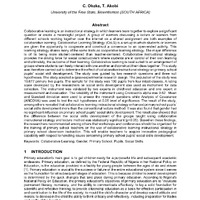Item
Effect of collaborative learning instructional strategy on social skill development of primary school pupils.
- Title
- Effect of collaborative learning instructional strategy on social skill development of primary school pupils.
- Author(s)
- Okeke, C., & Akobi, T. See all items with this value
- Date
- 2023 See all items with this value
- Description
-
Collaborative learning is an instructional strategy in which learners team together to explore a significant question or create a meaningful project. A group of learners discussing a lecture or learners from different schools working together over the internet on a shared assignment are both examples of collaborative learning. Collaborative Learning Strategy (CbLS) is a set-up in which students or learners are given the opportunity to cooperate and construct a consensus to an open-ended activity. This learning strategy shares many of the same traits as cooperative learning strategy. The major difference is of its being more student-centered than teacher-centered. Collaborative instructional strategy provides the driving force for social constructivism where students are in control of their own learning and ultimately, the outcome of their learning. Collaborative learning is best suited to an arrangement of groups where students can freely interact with one another and construct their ideas together. This study was therefore carried out to determine the effect of collaborative instructional strategy on primary school pupils’ social skill development. The study was guided by two research questions and three null hypotheses. The study adopted a quasi-experimental research design. The population of the study was 19,677 primary five pupils. The sample for the study was 130 pupils from four intact classes. A rating
scale developed by the researchers on social skills development was used as instrument for data
collection. The instrument was validated by two experts in childhood education and one expert in
measurement and evaluation. The reliability of the instrument using Cronbach’s alpha was 0.82. Mean and Standard deviation were used to answer the research questions while Analysis of Covariance (ANCOVA) was used to test the null hypotheses at 0.05 level of significance. The result of the study, among others revealed that collaborative learning instructional strategy enhanced primary school pupils’ social skills development more than the conventional lecture method. It was also found that gender had no significant influence on primary school pupils’ social skills development. The result also showed that the difference between the social skills development of the groups taught using collaborative instructional strategy and lecture method was statistically significant (p<0.05). Based on these findings, the researchers recommended among others that workshops and conferences should be organized for the training of primary school teachers on the use of collaborative learning instructional strategy in primary school classroom instruction. This will enable teachers to acquire innovative pedagogical capability with respect to handling issues concerning primary school pupils’ social skills development. - Publisher
- EDULEARN23 Conference See all items with this value
- Identifier
- DOI
- Keywords
- Collaborative Learning, Gender, Primary School, Pupils, Social Skills See all items with this value
- pages
- 0419-0425
- Item sets
- Conference Papers/Proceedings
- Media
-
 PDF
PDF

